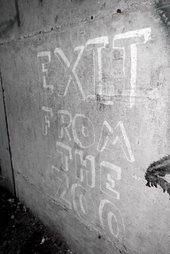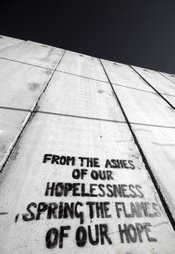Thursday, May 31, 2007
House of Nakba
The door still stood upright amid the broken cement walls. The door had a window, perhaps a window of hope.
Taking someone’s land is like taking someone’s life. Destroying someone’s house is like destroying their soul.
The family stands on the rubble. Mother, father, and son. Their struggle is long and difficult. An eternal struggle it seems.
The father looks at me and says, “Everywhere this is the same, the same story, the same same.
Go to Jenin, same same. Go to Lebanon, same same. Go to Gaza, same same. Same same. It’s not so different.”
But there is hope, right? Perhaps to rebuild the house for the third time? But, will the bulldozers come a third time? Will the house stand, remain?
The rebar, twisted and bent, lay scattered around the broken house. But the window in the door stood out, perhaps as hope for the future. A window of hope? A door to a better future? It stood there, alone.
“We want to live in peace with our neighbors. We don’t hate the Israelis, the Israelis are good people. But look at what the powers are doing.
What can we do?”


Tuesday, May 29, 2007
Monday, May 28, 2007
Talate
The coffee’s good here. Really good. You learn to appreciate small things in prison. Haleema means wise in English. I appreciate that. I think it’s beautiful. By the time the “security barrier” is finished it will snake over 450 miles, annexing 25% of the West Bank—farms, houses, businesses. If I told you that it’s illegal in the West Bank for a Palestinian to dig a well, what would you say? Or what if I told you that the water that runs through pipes in Palestinian cities in the West Bank can be turned off by remote control somewhere in Israel? What then?


Still, the children laugh. Life goes on. Their ability to adapt to occupation will never cease to amaze me. They paint on the walls of their refugee camps, the place where they are forced to live because they’ve lost everything. Yet these murals don’t depict hatred and revenge. They are their dreams of life outside of prison. When I encounter a sort of fear I have never felt before, the men tell me that this invasion wasn’t so bad. I nearly cried I was so afraid. A boy said that if he did not have to hide from the soldiers with his family, he would have thrown stones at them with the other boys. They are beautiful and broken with strength I could never have imagined…while I pretend Jeremy doesn’t exist.


I stand there on the concrete, the sun in my face, my eyes squinting, and my skin burning. A bead of sweat rolls down my cheek. I stare at the wall—it’s big and overwhelming. I just stand there staring. The wall is made of concrete, but it’s not as thick as I had expected. Nonetheless, this “security barrier” cuts off the people’s livelihood, their olive trees, their fields, their houses. “Hate builds walls, hope builds bridges.” Who is hate, and why is he building walls? Who is hope, and where are all the bridges?
The explosions go off in the camp. The soldiers are back again, but this time they do not bother to use the roads in the camp. They’re going through the buildings, literally. They’re using explosives to tear through the camp, making huge holes in the walls of homes, causing horrific noise, great pain, and even death. As the little girl’s mother stood by the door waiting for the soldiers to knock, the wall and door blew up in her face and sliced her. The soldiers didn’t let the girl’s father call the ambulance until several hours later. The little girl’s mother died. What do you say to that?


Sunday, May 27, 2007
It was a short night
The one whose face you cannot see,
Who comes in a pack of identicals,
Would you invite him in to your home?
Would you love him, are you radical?
The pack storms down the alley,
With their roaring engines,
And their spotlights wandering.
You cannot see their faces,
But are they equally scared?
Is that why they hide their faces?
Is that why they roam in packs?
Is that why they carry black snakes?
Is that why they dress in green?
If for you they were coming,
What would you do?
Would you be frightened?
Would you be scared?
Would you fight them?
Would you hate them?
Could you love them?
Helpless you sit in a room with others,
Peering out the window,
Trying to find out what the pack is doing out there.
Boom! Boom!
Huge explosion down the street,
The night sky lights up,
An anguishing second of gasping and fear.
Are you next?
The spotlight shines in your eyes.
Move away from the window,
The black snakes are looking at you.
Hissing… they watch ready to bite.
A flame shrieks across the street,
Extinguishing on the pavement.
Screaming and yelling.
But you sit there helpless.
Are you hopeless?
The pack rushes into the blue light doors.
After some noise and confusion,
They emerge from the blue light doors,
With a man dressed in white,
Hand-cuffed, and blindfolded.
The pack devours three others,
Then slyly they slither off
With their black snakes in hand,
With their engines roaring.
“This happens all the time,” says Ali.
“It was a short night.”
“This night was short.”
Saturday, May 26, 2007
The Holy City
I look out the window here, on the fourth floor, and I see the hot sun beating down on Bethlehem. I see the mosque; it is right in front of me. I hear the call to prayer. There are more taxis rumbling by on the street than there are pedestrian cars. Everyone needs work. 60% of Palestinians in Bethlehem are unemployed. Honking horns provide the soundtrack as I look out over a city. It is as if the whole city cries to be heard. They honk to be noticed. As if to say: “I am here” “I am human” “I demand recognition and rights” As the call to prayer rises over the sounds of the street, giving the city scene a mystery and certain significance, I can’t help but think that Bethlehem is holy. Holy, blessed. “Blessed are those who are persecuted because of me”
As the call to prayer fades I can’t help but wonder whether God has abandoned his sons and daughters in Bethlehem.
“As a people of faith we must also be a people of hope”
I sit here with Ibrahim, sipping my tea. He smokes his cigarette; I chew my mint tea leaf.
“We think justice can come to this land one of these days, and that is our hope”
The children are playing outside, swinging on the swings, sliding down the slides, running around making a joyful noise.
“People are squeezed onto small reservations, per se”
Cantons. If Palestinians had black skin the world would be up in arms about their plight. But they’re not black. They're Arab.
But the children find an outlet. They can find joy within the walls of separation, hate, and anger. At least for now.
“Just as much as we believe in life after death, we believe in life before death”
Life in Bethlehem is beautiful and precious for its fragility. The holes that remain in many buildings from the 2nd Intifada are scars that remind us just how fragile life can be when superpower armies attack children who throw stones to fend off tanks.
“We choose hope, but hope has not chosen us.”
Bethlehem is rocky. The whole city…the streets, the buildings, the walls seems to be built into or out of the white rock that is everywhere in the city. Hewn from stone. The city is broken but strong and resilient like its people. They choose hope.
“Hope which is not risking is not hope; just like hope without promise is not hope at all”
As I walk down the street tenacious little shrubs poke out from the rocks. Hope is risky. Even deadly. Hope demands one confront the evil. Hope inspires action over apathy. Hope demands that destructive forces be met with creativity and nonviolence. Many people I have met in the last few days—Palestinians, Israelis, Internationals—remind me of those obstinate little shrubs springing up from the rocks. They hope enough to risk being alive and beautiful and creative in the midst of a lot of death and darkness. Like water springing from a crack in a rock the Palestinian nonviolent struggle draws its life from some hidden source and springs out in the most unlikely places.
Monday, May 21, 2007
Yallah
Megan, Adam, and Peder will be traveling in the Middle East this summer. On this blog we hope to post our stories and reflections of our trip. Stay tuned to learn more.



















